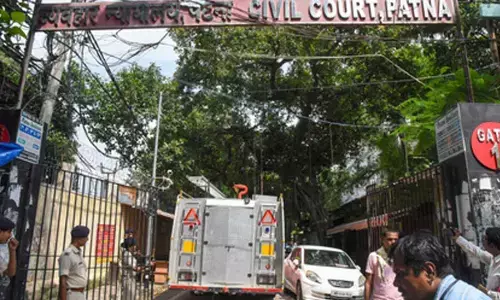Private nurseries mushrooming in Anantapur dist
 A nursery raising variety of roses at Kanekal mandal headquarters in Anantapur district. (Below) Mango-fruit grafts at a nursery in Garladinne mandal
A nursery raising variety of roses at Kanekal mandal headquarters in Anantapur district. (Below) Mango-fruit grafts at a nursery in Garladinne mandalhere is a demand for establishment of more nurseries in the district in view of the growing potential for horticulture plantations in the context of the district being in the process of emerging as a horticulture hub.
Anantapur: There is a demand for establishment of more nurseries in the district in view of the growing potential for horticulture plantations in the context of the district being in the process of emerging as a horticulture hub. The department of Horticulture is encouraging economic activity for young entrepreneurs to set up horticulture, floriculture and ornamental plant nurseries in the district.
There are nearly 400 nurseries operating in the district and yet the horticulture farmers are heavily depending on outside supplies from Kadiyam in East Godavari, Bengaluru, Nizamabad in Telangana and even Allahabad in Uttar Pradesh, apart from scores of nurseries supplying plants on the Karnataka border. Nurseries have come up even in the town to cater residents, who are raising flower and horticulture plants due to a new awareness among them on greening their houses, streets and roads in the city.
However, to ensure quality plants and have some sort of control over pricing, the department of Horticulture is educating farmers regarding a new Horticulture Act requiring those who set up nurseries to register with the government.
In view of the mushrooming of hundreds of nurseries in the district, the horticulture task force is now engaged in visiting private nurseries and inspecting quality and asking all promoters of nurseries to get themselves registered with the government or face closure.
Deputy Director of Horticulture Subbarayudu told The Hans India the prices and quality of plants also would be monitored once the nurseries are registered. Already 50 nurseries have registered themselves with the department. It is also encouraging setting up of more nurseries to cater to the increasing demand for horticulture plants.
The Horticulture department is also running its own nurseries for supply of plantation to farmers. It has a berry nursery in Hindupur, pomegranate in Kunderu, mango plants in Anantapur and Papaya at Chigicherla. The department is also promoting low cost shade net nurseries by offering subsidies and incentives etc.
The district is emerging as the nursery hub with hundreds of private nurseries operating in different parts of the district and catering to farmers and domestic requirements. As one traverses towards down country in any route be it Kalyandurgam, Bellary, Bengaluru highway, Battalapalle, Penugonda, Kadiri and Hindupur areas, one can see hundreds of nurseries dotting the main routes of the mandals with thousands of saplings being raised under the shade net.
The farmers, who once depended on seeds are now opting for nurseries which supply saplings. Of late, the demand is for 6-8 meter grown up plants to hasten the process of early production and to bring down the gestation period between sowing seed and yielding of fruit.
Horticulture farmers of mango, guava, papaya, musk melon, watermelon, sweet cucumber, Sapodilla (sapota) berry, pomegranate and sweet oranges etc are still dependent upon supplies from Kadiyam nurseries. Even the local shade net nurseries are dependent upon Kadiyam nurseries.
Obuleshu and others running nurseries on the Kalyandurgam road says that every week lorry loads of plants arrive from Kadiyam.
The plants which are in demand include 10 feet long mango plants, guava, berry (neredu), banana and papaya plants which are ready for plantation. These plants reach fruit-bearing stage within six months to one year and therefore they are in high demand. They revealed that for setting up a nursery, they invested Rs 4 lakh for pillars, trays, plastic sheets, bore-well and shade net etc.
In one acre about 70 to 80 mango plants can be raised. Each farmer is purchasing 400 to 500 plants for raising a mango farm in four to five acres of land. Amarender Reddy, a farmer who purchased 400 mango plants, from a nursery says that horticulture plantation yields rich dividends in the long run despite the long gestation period of one to three years. Once the plant reaches fruit-bearing stage, it is regular handsome income for the farmers, says Reddy.
Each mango and berry plant measuring 10 to 12 feet, he says, he had purchased for Rs 350 to 400. In these days of uncertainty in profitability of agriculture farming, horticulture crops are promising to farmers, in view of cost-effective maintenance and less labour requirement, says Ramana, who is maintaining a nursery on the Pamidi and Guntakal road.
On the Kalyandurgam road, there are tens of tomato and vegetable nurseries supplying seeds and saplings to farmers. Apart from landless farmers running nurseries in leased lands, about 400 farmers in the district have ventured into nurseries on their own lands in 630 acres in the district.














